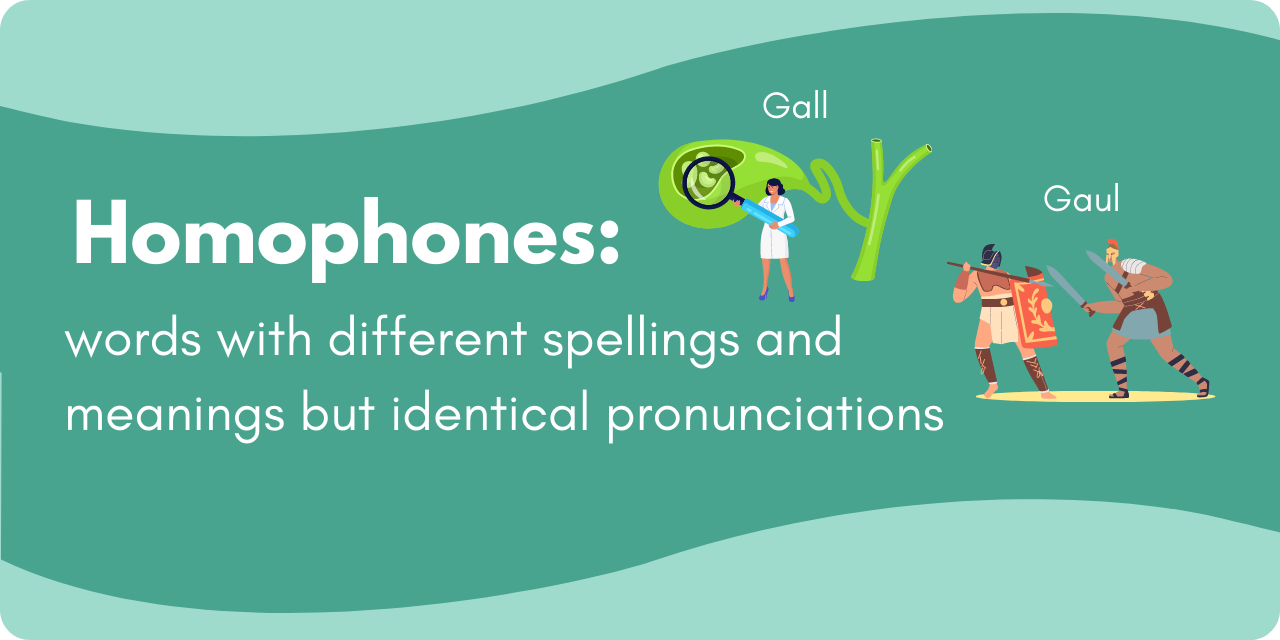Let’s discuss gall vs. gaul – two commonly confused words because they are pronounced exactly the same way but they’re spelled differently and have different definitions, making them homophones.

Homophones are words with different spellings and meanings but identical pronunciations. Homophones exist due to the always-changing English language and are a challenge for anyone learning to speak English. It can be challenging to learn how to spell different words that sound identical. The way the spelling and definitions vary can be confusing even to native English speakers when learning vocabulary correctly.
Appropriate pronunciation of spoken English may help the listener differentiate between homophones and comprehend the proper spelling; the words affect-effect are a perfect example. Like the words to, too and two, or horse and hoarse, they are indistinguishable from each other and frequently misused.
Pronunciation is usually unclear, as English pronunciation may vary according to dialect and because English spelling is continuously developing. Pronunciation may vary even though the spelling doesn’t, creating two words that are pronounced in the same way but have different definitions, just like night and knight.
Phonological spelling and spelling rules don’t always work. Most people avoid misspelling by exploring vocabulary words from spelling lists, improving their literacy skills through spelling exercises, and learning words in English by reviewing an English dictionary English words are also spelled according to their etymologies instead of their sound.
For example, the word threw is emanated from the Old English word thrawan, and the word through originated from the Old English word thurh. Homophones are confusing words and are naturally misspelled because of the confusion that arises from words that are pronounced alike but have a very different use and etymology. A spell check software will seldom find this type of error in English vocabulary, so try not to rely on spell check but rather learn to spell. Even participants in spelling bees like the National Spelling Bee will ask for an example of a homophone in a sentence to understand which word they are to spell by using context clues. We will explore the different meanings of the homophonic words gall vs. gaul, the source of the terms, and some examples of their use in sentences.
Gall
Gall is a word with many different meanings. First, gall may mean bold, impudent, and brazen conduct. In this example, one is said to have the gall to do something. For instance: “He had the gall to tell me that I was a bad wife.” This meaning can also be used as a verb to express that one is bothered or aggravated by another person’s actions. Affiliated words are galls, galled, galling. The next definition of the word gall is the gallbladder of an animal or even the bile contained in any gallbladder. The third definition of gall is a growth on a plant or tree generated by fungi or insect larva. Gall is also used figuratively to mean cruel or callous. Lastly, gall may refer to a sore made by chafing, particularly on a horse. Gall stems from the Old English words galla and gealla.
Gaul
A Gaul is an ancient region or person from that region roughly corresponded to Switzerland, Germany, Belgium, and France. Gauls were a group of Celtic tribes and were conquered by Julius Caesar. They stayed under Roman law for many centuries. The word Gaul originates from the Latin word Gallia. Notice that Gaul is capitalized because it’s a proper noun.
Example The asceticism they embraced so exuberantly led many voters in the north and the Midlands to vote to leave in the 2016 referendum, and yet they have the gall to pose as prominent supporters.
Example Wages have been dormant since the 1970s, and billionaires like Gates have the gall to oppose insignificant tax hikes, which would hardly affect their elite standing but massively support the working class.
Example The station’s lunchtime talk show host Laurence Reed has been off-air since March after contracting sepsis as a result of an operation to remove a gall stone.
Example What galled me is that he blamed the government for the lost lives.
Example A common oak is burdened with knopper galls, deformed shiny walnut kernels supplanting smooth acorns.
Related: Here is another pair of often used, and often confused words: affect and effect.






